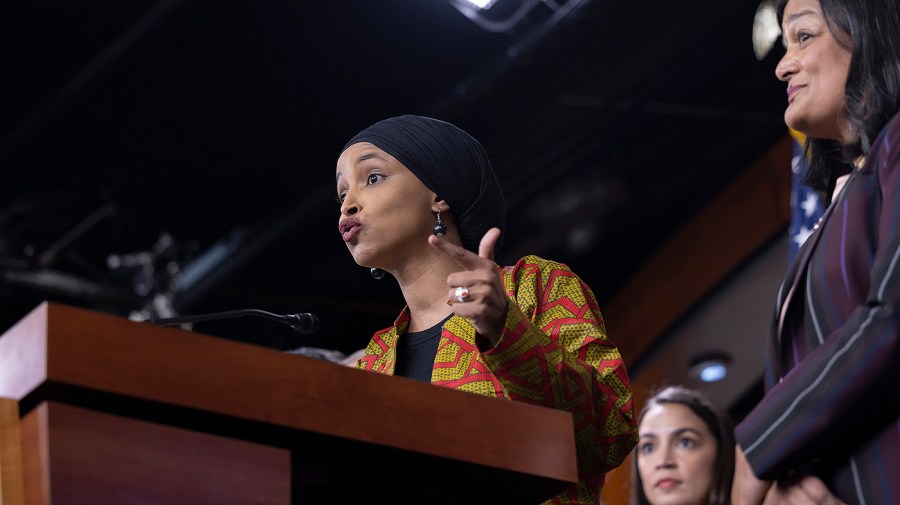
House Democrats sought to dial up the heat on Republicans on Thursday, as lawmakers considered a budget blueprint that could be key to enacting President Trump’s agenda, despite internal GOP rifts over spending and taxes that threaten to impede those efforts.
Democrats raised the alarm throughout the hearing over potential cuts to programs like Medicaid and Supplemental Nutrition Assistance Program (SNAP) while criticizing Republicans on tax proposals they argued would disproportionately benefit wealthier Americans and needling the party on the estimated economic impact of the plan.
While the 45-page resolution leaves out key specifics on Republicans’ cost-cutting plans, it includes broad instructions that call on committees to find at least $1.5 trillion in spending cuts over the next decade. But Democrats used much of time seizing on some Republican proposals that have been floated in recent weeks.
Among the amendments sought by Democrats included a change proposed by Rep. Ilhan Omar (D-Minn.), which aimed to strike instructions to the Committee on Agriculture, which the resolution called to find upwards of $200 billion in spending reductions.
“Let me be clear about what these cuts mean. We’re talking about slashing food assistance for 40 million vulnerable Americans,” Omar argued, accusing Republicans of putting programs like SNAP and WIC “on the chopping block.”
“Will we take food from working families, from children, from seniors, to give more money to billionaires and millionaires who never worry about grocery prices at the bare minimum? We must not let viral food assist be on the chopping block.”
Rep. Chip Roy (R-Texas) pushed back on Omar’s comments shortly after, pointing to increases in federal spending and the high inflation in recent years. He also noted Biden-era changes to the Thrifty Food Plan (TFP), which is used to determine benefit amounts for the SNAP program.
“We got here a unilateral action by the former president, which literally just dumped $250 billion into the SNAP program, just by executive action,” he argued, later saying, “Maybe we should take a look at SNAP.”
“Maybe, just maybe, we shouldn’t have a unilateral expansion by the president to expand a poor subsidy of our most vulnerable people,” he also said before adding that average families are spending “close to an average of $25,000 annually on health insurance between their employers and themselves, all with this false promise of Obamacare premiums magically giving them health care.”
Other amendments offered by Democrats included measures aimed at protecting Medicare, raising the corporate tax rate and closing the carried interest tax break.
Republicans pushed back on Democratic criticisms, making the case for curbing spending to tackle the nation’s $36 trillion debt while defending tax cuts the party hopes to protect.
At one point, Rep. Judy Chu (D-Calif.) offered an amendment to affirm that Social Security is “safeguarded” in the resolution, though she acknowledged the special process by which Republicans are trying to continue Trump’s expiring tax cuts does not allow for changes to the entitlement program.
“Instead of a bill that entirely sells out the working class families for the sake of making billionaires into trillionaires, we would have one right spot, a commitment to ensuring that Social Security Program is available for generations of Americans to come,” she said.
Rep. Blake Moore (R-Utah) said in response that he thinks the amendment “should be non-germane” and that his “Democrat colleagues are then going to use this as a way to write ads” to attack vulnerable GOP members.
“I hate to speak truth in Congress. I know it’s not that common, but that’s what’s going on here, unfortunately,” Moore said. “So, with all that said, I want to take an opportunity to invite my Democrat colleagues to dig in on the concept of a fiscal commission.”
Republican leaders have also drawn red lines around Medicare cuts to help foot the bill for Trump’s priorities and have downplayed the chances of cuts to Medicaid benefits. However, Republicans have discussed potential changes to the latter by way of proposals like work requirements.
None of the Democratic-backed changes are expected to be adopted, but provide a glimpse into the opposition campaign Democrats could be waging in the coming months as Republicans try to move forward.
The hours-long hearing comes a day after the Senate Budget Committee, also led by Republicans, advanced a narrower budget resolution aimed at boosting funding for border and defense, with sights set on moving a separate, larger tax package later this year.












